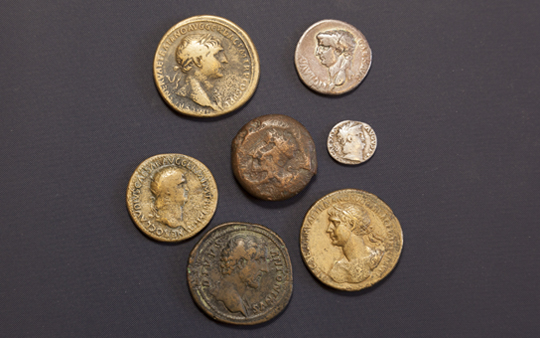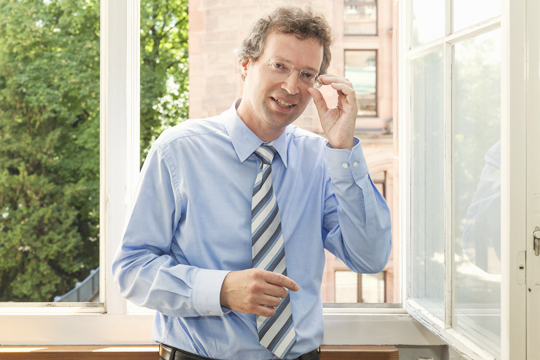Discovering coins anew
Freiburg, Jul 06, 2017
he state initiative „niche fields“ supported by the Ministry of Science, Research and Art Baden-Württemberg (MWK) funds fields with a low number of students or few nationwide university departments. The goal is to ensure the fields’ viability. Three Freiburg projects running for two years are being supported in the area of education. Julia Dannehl spoke with the initiators and is introducing their efforts through this series.

Coin collections enable long-range assertions about, for instance, the development of economic life. Photo: Ingeborg F. Lehmannn
Prof. Dr. Peter Eich and Prof. Dr. Sitta von Reden are running the numismatic project „Object – Digital Representation – Meaning“ in the Department of Ancient History. The goal is to bring numismatics up to speed digitally and to adapt to the demands and possibilities presented by the humanities. The initiative „niche fields“ is supporting the effort with about 133,000 Euros.
Mr. Eich, how can you call ancient history a niche field?
Peter Eich: The Department of Ancient History is a part of the large group called „History“. A partial area is singled out for which a relatively low number of students are engaged. Numismatics in particular enjoys a marginalized existence in the curricula and is therefore both a niche area of study as well one that requires funding as a part of the basic science landscape.
Why is numismatics so important for history?
Coins serve as an important source in ancient history in particular. They offer us access to many different areas because they combine many possible insights: there are both texts and images on the front and backsides of the coin. Roman imprints in particular give us insight into the spectacular rich imagery during antiquity and to which we no longer have access. The images and texts rely on events that were extremely significant for people. Coins often help us compare time intervals. Sometimes they provide particular dates.
So every coin tells a story?
Individual special coins can draw our attention. Using a sample, you can tell vivid stories. But it gets really interesting when you have a larger number of them. Collections allow us to reach long-range assertions.

Peter Eich wants to digitalize the University’s coin collection, thereby making it available to other research institutions. Photo: Ingeborg F. Lehmann
What kind of assertions?
We can determine how the coins were distributed. It gives us information about who used the coins and about, for instance, an army’s movements. In turn, it allows for assertions about economic history. We can also deduce information about economic life at the time from the metal they used. For instance, we see how Roman emperors had to manage their existing stockpile of precious metals to defray their costs. It is also interesting to see to what extent gold coins were made. Gold coins have a completely different purchasing power than bronze ones.
The entire Freiburg collection should be digitalized for the project. Why is that important?
In doing so, our coins will become visible beyond university borders. The collection will thereby gain more scientific use for historians who aren’t located in Freiburg. The information in the database, the signs and abbreviations are standardized and are therefore uniform with the data from other collections. That is extremely important for science. We used to have to deal with misunderstandings and varying signs.
Which benefits does the project have for students?
We offer seminars to both undergraduate and graduate students in which they gain numismatic skills. At the same time, they learn how to work with databases. We combine learning basic science of history with acquiring digital skills. But only students and researchers benefit from the project, but also other people who are interested in the topic. External people have the possibility to do an internship in database management. In addition, we take the coins to schools and try to teach students the connection between the coins and history and then the science of history.

